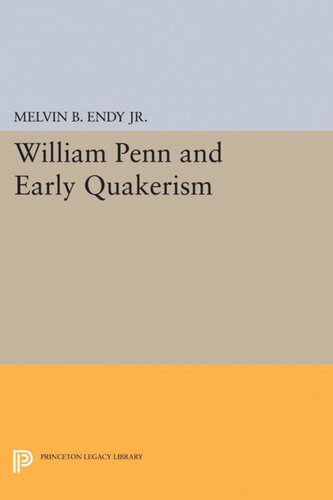

Most ebook files are in PDF format, so you can easily read them using various software such as Foxit Reader or directly on the Google Chrome browser.
Some ebook files are released by publishers in other formats such as .awz, .mobi, .epub, .fb2, etc. You may need to install specific software to read these formats on mobile/PC, such as Calibre.
Please read the tutorial at this link: https://ebookbell.com/faq
We offer FREE conversion to the popular formats you request; however, this may take some time. Therefore, right after payment, please email us, and we will try to provide the service as quickly as possible.
For some exceptional file formats or broken links (if any), please refrain from opening any disputes. Instead, email us first, and we will try to assist within a maximum of 6 hours.
EbookBell Team

4.1
40 reviewsWilliam Penn is justly famous for his part in the political development of colonial America. Yet he was also one of the leading Quaker theologians of the seventeenth century and the most important translator of Quaker religious thought into social and political reality, and his life and works cannot be fully understood without a knowledge of his religious hopes and ideals. Melvin Endy goes beyond the political histories, biographies, and histories of Quakerism to provide a comprehensive account of Penn's religious thought, its influence on his political thought and activity, and the significance of his life and thought to the Quaker movement.
His assessment of Penn's place in the Quaker movement and his discussion of Penn's thought in relation to Puritan, Spiritualist. Anglican, and pre-Enlightenment developments has led to an understanding of Quakerism that differs from the recent tendency to stress strongly its Puritan origins and affinities. Because of the revisionist nature of this interpretation and the author's conviction that early Quaker thought has never been adequately related to its intellectual milieu, this study of Penn has been developed into a vehicle for a new analysis of aspects of early Quaker thought. Finally, the Pennsylvania venture is examined and assessed as a laboratory in which the vision of a society run according to the principles of a spiritual religion was put to the test.
Originally published in 1973.
The Princeton Legacy Library uses the latest print-on-demand technology to again make available previously out-of-print books from the distinguished backlist of Princeton University Press. These editions preserve the original texts of these important books while presenting them in durable paperback and hardcover editions. The goal of the Princeton Legacy Library is to vastly increase access to the rich scholarly heritage found in the thousands of books published by Princeton University Press since its founding in 1905.